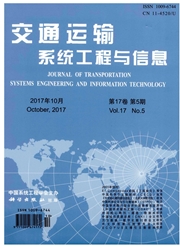

 中文摘要:
中文摘要:
早晚高峰时段非工作出行需求的增加,加剧了城市交通拥堵.本文采用基于活动的方法分析了通勤者非工作活动选择行为.研究以某直辖市居民出行调查数据为基础,将非工作活动发生时段数据作为截取样本,建立了通勤者非工作活动参与及活动时段安排的Censored Probit模型.从通勤者是否选择非工作活动和是否将非工作活动安排在上下班途中两个方面,讨论了通勤者非工作活动安排与通勤者及其家庭社会经济属性、非工作活动和通勤出行特征之间的关系.研究表明,出行者社会经济属性、交通系统属性、工作安排和通勤出行方式都是重要影响因素,所建立的模型能有效分析上述因素的变化对通勤者非工作活动选择行为的影响.本研究对交通需求预测和管理工作有重要意义.
 英文摘要:
英文摘要:
Commuters often introduce non-work activities to the basic home-work-home trip chain because of the temporal-spatial constraints from work activity.This commute trip chaining behavior may explain the rise in non-work trips occurring in peak periods and is posited as one reason for increased congestion problem in peak periods.Therefore,this paper focuses on commuters' decision of non-work activity participation and timing.Taking non-work stop-making data as a censored sample,a Censored Probit model is established based on the data from a household travel survey of a municipal city.The results provide useful insights into the effects of individual/household socio-demographics,transportation measures,work' schedule and mode choice on commuters' non-work stop making propensity in a highly urbanized environment.It also has important applications for predicting the changes in commuters' non-work stop-making behavior as a result of the changes in socio-demographics and transportation scenarios.
 同期刊论文项目
同期刊论文项目
 同项目期刊论文
同项目期刊论文
 期刊信息
期刊信息
